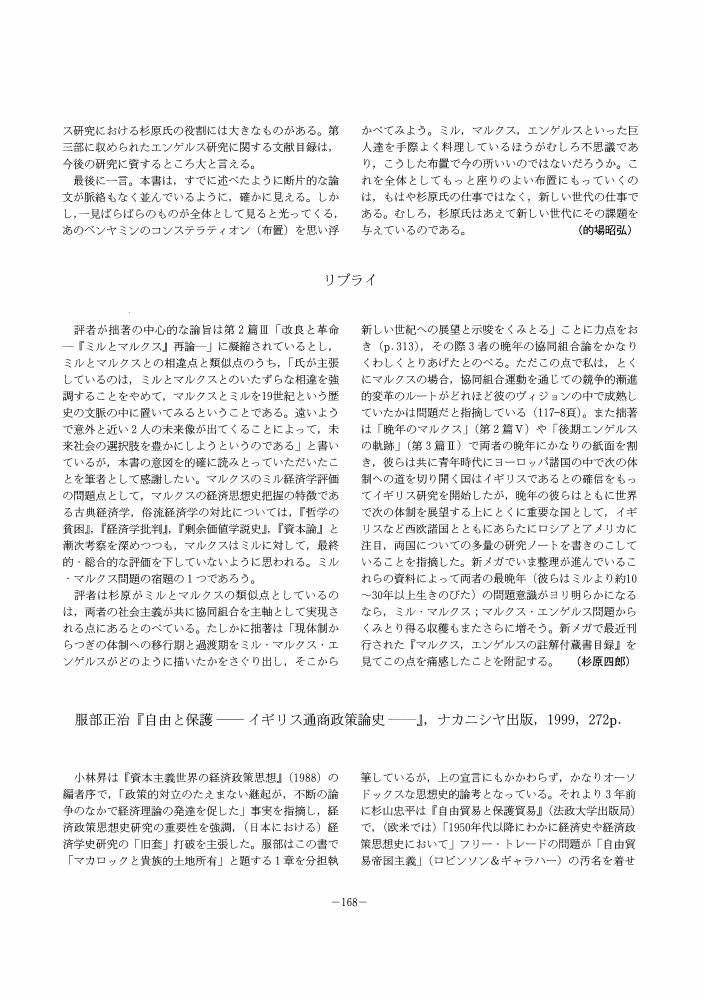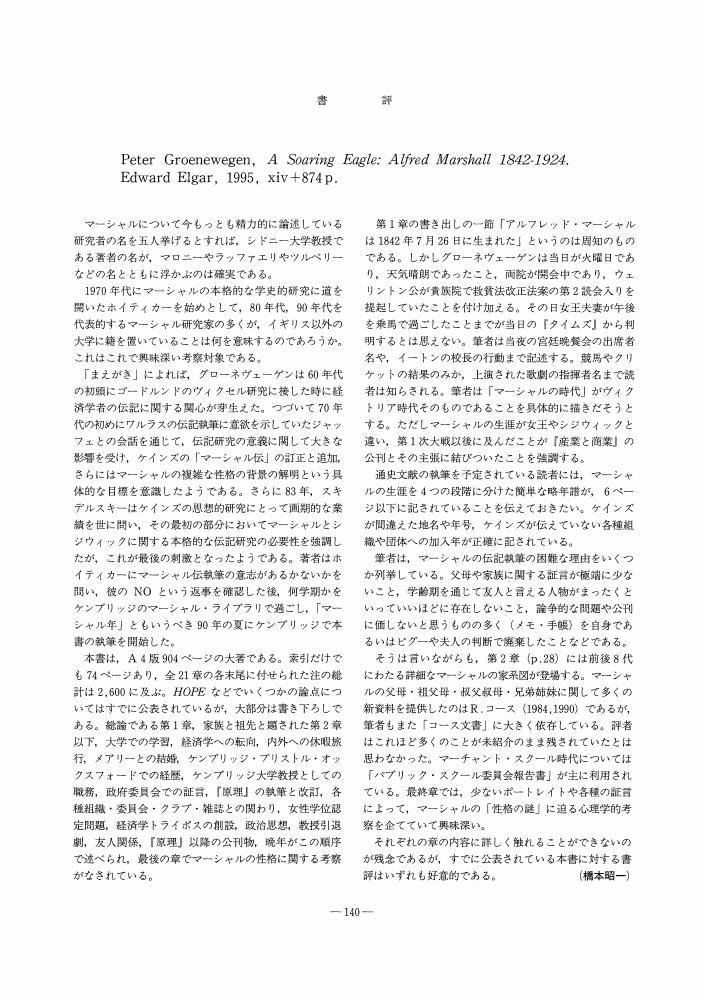3 0 0 0 OA 経済学トライポスの創設とマーシャル
- 著者
- 橋本 昭一
- 出版者
- 關西大学經済學會
- 雑誌
- 關西大學經済論集 (ISSN:04497554)
- 巻号頁・発行日
- vol.39, no.3, pp.463-486, 1989-09-30
1 0 0 0 近代経済学の形成と展開
1 0 0 0 OA 杉原四郎 J.S.ミルと現代
- 著者
- 杉原 四郎 松井 名津 橋本 昭一 Robert Chapeskie
- 出版者
- The Japanease Society for the History of Economic Thought
- 雑誌
- 経済学史研究 (ISSN:18803164)
- 巻号頁・発行日
- vol.60, no.1, pp.100-136, 2018 (Released:2019-09-03)
Introduction by Shoichi Hashimoto Shiro Sugiharaʼs “Nature, Human Beings, and Labour,” translated here into Eng-lish, was originally published in Japanese in J. S. Miru to Gendai (J. S. Mill and the Present Day), 1980, Tokyo: Iwanami Shoten, and reprinted in Volume 2, 2003, of The Works of Shiro Sugihara, 4 Volumes, 2003-, Tokyo: Fujiwara Sho-ten. Shiro Sugihara (1920-2009) began his study of the history of economic thought with a comparison of Karl Marx and J. S. Mill. While he does not ex-plicitly mention it in any of his writings, in this he may have been influenced by his mentor, Kei Shibata (1902-1986). Shibata had been attempting to further develop Marxʼs theory of reproduction using the methods of general equilibrium theory. While carefully tracing the process of development of Marxʼs economic thought, by explicating Marxʼs crit-icism of Mill Sugihara played a major role in the post-war Japanese movement to re-evaluate Mill, who had historically received only low appraisal. Sugihara presented Millʼs stance of engaging with contemporary economic issues in a positive light, an approach that is given full expression in the essay translated here. While Japanese readers would not require any explanation regarding Sawako Ariyoshi (1931-1984), the novelist who appears at the start of the es-say, she was a writer who raised new social issues such as synthetic pollution, food damage, issues related to the elderly, and so on, that have since become common knowledge, posing them to society in a series of works written in rapid succession that all went on to become bestsellers. As a result of the nature of her writing she was ignored by various literary awards.
1 0 0 0 OA マーシャルとケンブリッジ学派
- 著者
- 橋本 昭一
- 出版者
- The Japanese Society for the History of Economic Thought
- 雑誌
- 経済学史学会年報 (ISSN:04534786)
- 巻号頁・発行日
- vol.39, no.39, pp.66-73, 2001 (Released:2010-08-05)
- 参考文献数
- 42
Marshall's theoretical and educational efforts and success in the field of economics was already highly appreciated even in his day. Nevertheless, it is a curious fact that almost all of his students and disciples at Cambridge or at other institutions have gradually hesitated to follow the lines he indicated. This is one of the reasons why he was called a ‘soaring eagle’ or ‘enigma’. In order to not only reassess Marshall's economic thought, but also to elucidate his attitude foward contemporary economists and their methodology, much important material has been published in the last decade, namely by Whitaker (1990), Raffaelli (1990), Groenewegen (1995), Raffaelli (1995), Whitaker (1996), Groenewegen (1997), Groenewegen (1998). These works consist of a new bulky biography, collected works of 8 volumes, more than a thousand items of correspondence, a collection of ‘unknown voices’ in response to Marshall's economics, critical essays, and Marshall's unpublished lectures. Also very beneficial for Marshall scholarship are materials such as The collected Works of Sidgwick (1996) and Fawcett (1995). In the beginning of the new century, we can start to analyze such questions as ‘Is Marshall a communitarian or a libertarian in his circle?’ In this case, we should like to include Sidgwick and Fawcett in the Cambridge Circle.
- 著者
- 橋本 昭一
- 出版者
- 経済学史学会
- 雑誌
- 経済学史学会年報 (ISSN:04534786)
- 巻号頁・発行日
- vol.38, no.38, pp.168-170, 2000 (Released:2010-08-05)
1 0 0 0 OA Peter Groenewegen, A Soaring Eagle: Alfred Marshall 1842-1924. Edward Elgar, 1995, xiv+874p.
- 著者
- 橋本 昭一
- 出版者
- The Japanese Society for the History of Economic Thought
- 雑誌
- 経済学史学会年報 (ISSN:04534786)
- 巻号頁・発行日
- vol.34, no.34, pp.140, 1996 (Released:2010-08-05)
1 0 0 0 OA マーシャル『原理』の方法的・思想的性格
- 著者
- 橋本 昭一
- 出版者
- The Japanese Society for the History of Economic Thought
- 雑誌
- 経済学史学会年報 (ISSN:04534786)
- 巻号頁・発行日
- vol.29, no.29, pp.12-16, 1991 (Released:2010-08-05)
- 参考文献数
- 9
1 0 0 0 OA 最近のマーシャル研究
- 著者
- 橋本 昭一
- 出版者
- The Japanese Society for the History of Economic Thought
- 雑誌
- 経済学史学会年報 (ISSN:04534786)
- 巻号頁・発行日
- vol.27, no.27, pp.48-54, 1989 (Released:2010-08-05)
- 参考文献数
- 125
- 著者
- 橋本 昭一
- 出版者
- The Japanese Society for the History of Economic Thought
- 雑誌
- 経済学史学会年報 (ISSN:04534786)
- 巻号頁・発行日
- vol.24, no.24, pp.63, 1986 (Released:2010-08-05)





